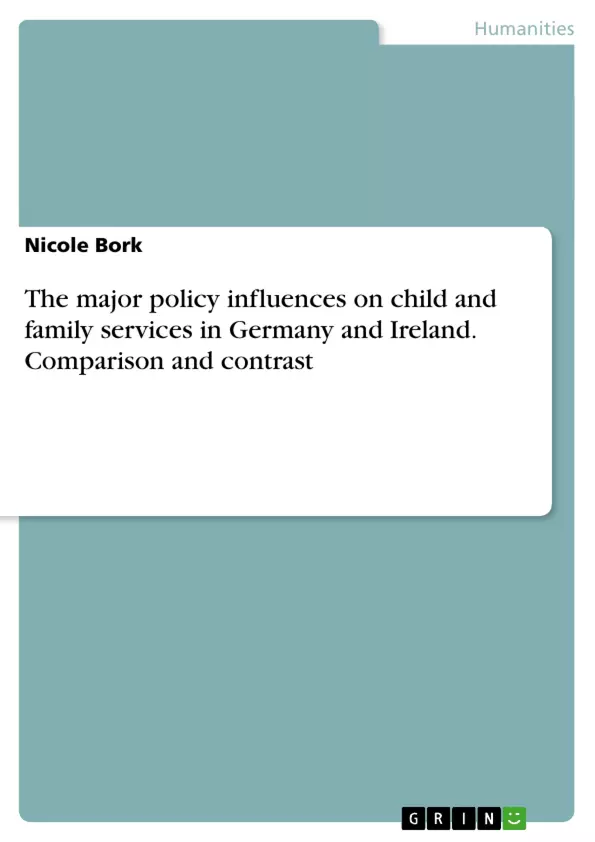Over the years the image of “the family” changed a lot due to political, historical, socio-economic, cultural, religious, demographic, social and many other influences and circumstances. It is not possible to talk about the family anymore or give an explicit universal definition, as various family forms exist in our modern society nowadays. A common term used to describe this state is “Plurality of Family forms”, meaning that family not only consists of married couples with children but also relatives, non-marital partnerships with or without children including same sex couples, marriages without children, lone parents and many more. The Family can be understood as a dynamic social system.1
In order to draw a clear picture of how Social Work in child and family services works today and what it is influenced by, it is necessary to start from the very beginning.
The first part shortly reflects on what is meant by the terms “family” and family policy.
The following two sections shall provide an insight into the German as well as the Irish history of politics and policy making for this target group.
We learn about the differences of the two systems especially in relation to policy influences on child and family service provision in connection with Social Work.
The essay concludes with a comparison of the two state’s policies.
This work’s main focus lies in contemporary policy influences on Social Work within child and family services. It can only provide a superficial overview of definitions and historical changes. However, they need to be mentioned as they embody the basis of today’s developments. It is beyond the scope of this essay to address all historical events and therefore the focus lies on the main developments from the last century until today.
1 Barabas, F. K.; Erler, Michael. 2002.
Inhaltsverzeichnis (Table of Contents)
- Introduction
- The changes of family life and family policy
- Families
- Family Policy
- Ireland
- Historical Developments
- Relevant Acts and Policies
- Social Work with families and children
- The Childcare Act 1991
- Germany
- Historical Developments
- Social Policy in the GDR and after the reunification
- Social Work in child and family services
- Social Work and Social Pedagogy – the difference
- Germany's Child and Youth Services (Kinder- und Jugendhilfe) and Youth offices embedded in the federal system
- The KJHG or SGB VIII and other relevant policies
- The act's principles, aims and provisions
- Endangered and delinquent young people
- Historical Developments
- Conclusion - Contrasting major differences
Zielsetzung und Themenschwerpunkte (Objectives and Key Themes)
This work examines the major policy influences on child and family services in Germany and Ireland, focusing on contemporary developments. It aims to provide a comprehensive overview of the historical and political context that shapes social work practices in these two countries.
- The evolving definition of "family" and the impact of family policy
- Historical and political influences on child and family services in Germany and Ireland
- The role of the state and the Catholic Church in shaping family policy in Ireland
- The different approaches to child and family services in Germany and Ireland
- The impact of social work in child and family services on both countries
Zusammenfassung der Kapitel (Chapter Summaries)
- Introduction: This chapter sets the stage for the analysis by discussing the changing concept of "family" and the importance of understanding historical and political contexts in shaping child and family services.
- The changes of family life and family policy: This chapter defines "family" and "family policy" and explores how both concepts have evolved in response to social and political changes.
- Ireland: This section delves into the historical developments and relevant acts and policies that have influenced family policy in Ireland. It highlights the role of the Catholic Church and the state in shaping family structures and social work practices.
- Germany: This chapter explores the historical development of child and family services in Germany, including the impact of social policy in the GDR and the reunification. It analyzes key legislation and explores the role of social work and social pedagogy in providing services to families and children.
Schlüsselwörter (Keywords)
This work focuses on the key topics of family policy, child and family services, social work, social pedagogy, historical developments, and comparative analysis. It examines the influence of legislation, cultural values, and religious institutions on the provision of services for families and children in Germany and Ireland.
Frequently Asked Questions
How has the definition of "family" changed in modern society?
Modern society recognizes a "plurality of family forms," including non-marital partnerships, same-sex couples, lone parents, and marriages without children, moving beyond the traditional nuclear family model.
What is the significance of the Childcare Act 1991 in Ireland?
The Childcare Act 1991 is a cornerstone of Irish legislation that reformed child protection and welfare services, defining the state's role in supporting families.
How does German child and youth service (Kinder- und Jugendhilfe) operate?
In Germany, these services are embedded in a federal system, guided primarily by the SGB VIII (KJHG) act, which outlines principles for supporting endangered or delinquent young people.
What is the difference between Social Work and Social Pedagogy in Germany?
The text explores the distinct professional and theoretical differences between "Sozialarbeit" and "Sozialpädagogik" within the German service provision context.
What role did the Catholic Church play in Irish family policy?
The Catholic Church historically had a profound influence on shaping family structures and social work practices in Ireland, which is a key point of comparison with the German system.
- Citar trabajo
- Nicole Bork (Autor), 2007, The major policy influences on child and family services in Germany and Ireland. Comparison and contrast, Múnich, GRIN Verlag, https://www.grin.com/document/76187



